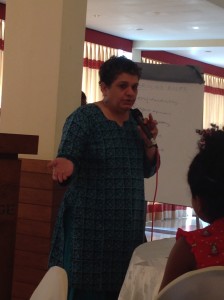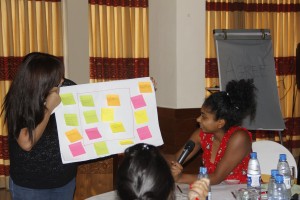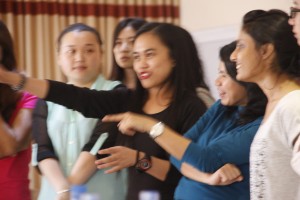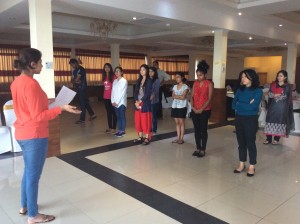Taking off the Gender Lens
Participants from eleven countries across the Asia-Pacific region launched into day 1 of ASAP’s Safe Abortion Advocacy Institute for Youth Champions by looking at gender construction, gender myths and resultant discrimination against women.
GENDER BENDERS: How do gender roles emerge?
Facilitator, Manisha Gupte initiated a discussion on gender by gauging the level of understanding of gender and biological sex among participants. She asked participants how we as a society determine the difference between boys and girls at different life stages. Participants discussed how social attributes of gender, such as the length of one’s hair, are visible from early childhood and therefore they seem natural and biological. This social conditioning results in the perpetuation of certain gender myths such as “Women are patient, Men don’t cry”
Manisha Gupte, then led a discussion on the hypocrisy of GENDER constructs. “When it’s unpaid, laborious, unappreciated – it’s women’s work. When it comes from the private sphere into the public – gets recognition, is paid and appreciated – it’s men’s work.” The facilitator then used this discussion to introduce how gender conditioning influences reproductive health issues including who uses contraceptives. She asked participants to consider how even though men are more “linked to reproduction” because they release sperm each time they have sex, yet contraceptives are geared towards women instead.
What is wrong with these gender roles? Participants discussed how gender roles discriminate against some groups, give privileges to some and not others, create risks for certain persons and society gives roles to people based on physical traits not on their desires, capabilities etc. They discussed what happens when men and women don’t conform to gender roles and expectations – they are discriminated against. A participant from Myanmar shared that in her country girls are required to have higher marks to enter medicine – because there is a perceived concern for their safety due to late working hours.
The facilitator also introduced the concept of heteronormitivity and how it starts from childhood, when we’re given dolls to play with as girls and given sports equipment to play with as boys. These same ideas and expectations come into marriage aspirations.
“When young girls play with dolls they go through all the stages of growth until the doll gets married and then the game ends at marriage. This shows the mentality that life is over after marriage and there’s no more story left in the doll’s life.”
– Suleiman, Afghanistan, Youth Champion
PATRIARCHY: Rule of the fathers
Manisha asked the group to share examples of how conforming to the rules of patriarchy results in rewards and how one’s position grows – and examples of how non-confirmation is punishable. She explained how women’s reproduction is controlled in order to ensure pure lines of blood passed through generations of men. And this control over women’s reproduction is done through controlling their sexuality. The group then looked at various agents of patriarchy that perpetuate this control over women’s sexuality, reproductive rights and right to abortion in particular.
NEEDS OR RIGHTS? Who gets to decide?
Manisha asked the group to consider what are our basic human needs and how these become rights. Participants enquired into how the market influences wants and creates demands. She emphasized that if needs become rights – then we can lobby or advocate for them to be provided. If they are just needs then we’re dependent on others to grant us these needs and these aren’t legally enforceable. She encouraged the group to always adopt a rights based approach versus a needs based approach. And in the case of safe abortion, to always give the decision making power to the woman.
“Difference, disadvantage, disparity = discrimination” – Manisha Gupte
The group then discussed the significance of the paradigm shift at the ICPD, from demographic goals to individual reproductive rights. They learned the history of how reproductive rights emerged within the global discussion on population and development.
“Human rights are universal, equally important and they’re interdependent”.
CLARIFYING VALUES
Participants had to choose ‘Agree’ or ‘Disagree’ with certain statements such as ‘can sex workers be raped’, ‘does a woman who chooses an abortion violate the right to life of a fetus’, ‘if the husband wants to keep the fetus, does the woman still have a right to abort it’ etc. The facilitator then explained how we arrive at our values and how these change over time. “No one was born as safe abortion advocates, we’re all subjected to social norms around us – it’s up to us to decide what our values are”. She invited participants to question to dominant notion or social norms and arrive at their own set of values related to sexual and reproductive rights.
POWER WALK: Who has access to information on abortion?
Youth Champions learned about the various levels of privilege given to certain groups based on class and economic status and how this impacts who has access to information on abortion.
Day one concluded with the screening of Dirty Dancing, a mainstream Hollywood film that highlights the issue of abortion. Participants were then invited to a dinner party so as to get to know each other better.













